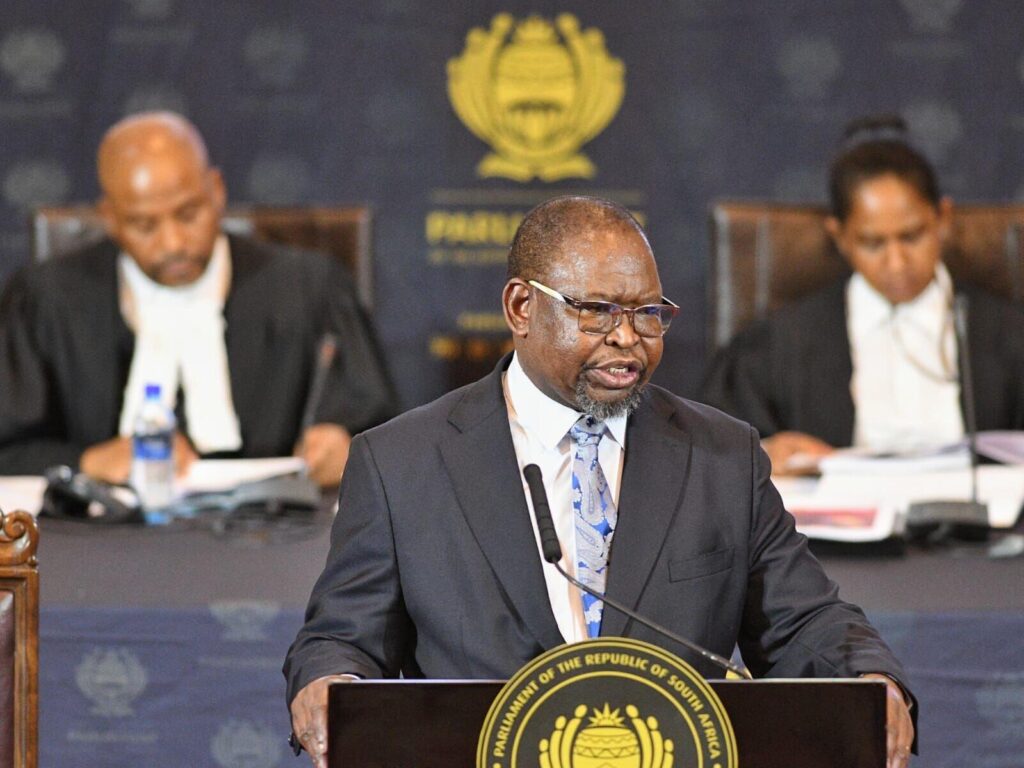
MTBPS: Finance Minister Enoch Godongwana
On Wednesday November 1st, the Minister of Finance Mr Enoch Godongwana delivered the Medium Term Budget Policy Statement (the MTBPS). This year’s speech was a very political one ahead of the 2024 national elections. This budget speech followed on the President’s speech on Monday evening which has been dubbed an election speech for the ruling party.
The MTBPS announcement of the further extension of the R350 Social Relief of Distress grant took many people by surprise, given the dire warnings by the Finance Minister of impending cuts to key social programmes ahead of his speech.
The Social Policy Initiative (SPI) welcomes the pronouncement made by the minister to extend the SRD grant by an additional year. However, the amount on the grant of R350 is still too low to have any real impact on the economy and on meeting people’s basic needs and their constitutional right to dignity. SPI also welcomes the commitment to provide a comprehensive overview of the social security system in South Africa, together with public works programmes – both of which are critical for South Africa.
For the last decade the Social Policy Initiative has been a lead participant in the NEDLAC Comprehensive Review of Social Security. The current system of social security has its roots in the Apartheid system of welfare poverty grants, mainly for white children and older people. It was not designed to include the millions of working- age people in South Africa, the majority of whom are black.
We call on the state as part of this review to republish the Green Paper on Social Development that was released and then withdrawn two years ago. The Green Paper was the culmination of the many years of hard work by Labour, Community Constituency, Business and Government at NEDLAC.
Over half of the South African population lives in poverty, and 41% of working -age people are unemployed. This calls for a much more sophisticated understanding of income support in South Africa, one that understands income support as being integral to an economic stimulus as well as meeting social imperatives.
The Social Policy Initiative has published research that demonstrates how Universal Basic Income indexed to the Upper Bound Poverty Line can eliminate poverty overnight, stimulate economic demand and seriously reduce the structural unemployment levels.
The idea that government has to borrow or tax to finance any growth policy is not true. The are many ways a country can finance an economic stimulus package without having to borrow or increase taxes on the 20% of South Africans fortunate enough to be contributing to Personal Income ta . As the Initiative we have looked at the use of access Foreign Exchange Reserves as well as new sources of financing such as Green Climate Funds that can be used to finance such a stimulus. A Sovereign Wealth Fund can be used to receive such funding as is done in both developed and developing countries globally. South Africa’s VAT system can also be relooked and adjusted to include luxury goods and used to finance such stimulus package.
The current macroeconomic landscape of cutting expenditure is not conducive for an expansionary economic stimulus. This will require a strong political will from the government to push back on pressures to cut spending in a country that is struggling to grow at 2% of GDP. Projected economic growth for South Africa for the next two years is expected to peak at 1.6%. This is dismal, and it is counter intuitive that at a time when economic growth is grim the government would embark on contractionary macroeconomic policies.
In his speech on Monday night, the President acknowledged the great impact that the R350 grant has made on people’s lives and their ability to look for jobs and start their own economic activities. We are pleased that this programme of income support has been extended, but for it to have a greater impact it needs to go to more people, more frequently and at a much higher level.
Of all the growth plans tabled, this would be the most successful. It is affordable, and it is also the right thing to do.
Isobel Frye Executive Director and Noma Jakuja, Senior Research at SPI, a feminist social security think tank in South Africa.
SPI has produced A Decent Path, a documentary on the R350 grant with UNICEF and assistance of Department of Social Development. This film will be available for download at the end of November on www.spi.net.za.









